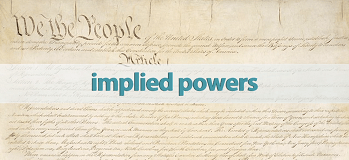Implied Powers:- In layman's language, the term implied powers can be defined as those powers of specific branches of a government that are not expressly provided in the Constitution of the country but are deemed proper and necessary to exercise the expressly defined powers.
Within the United States of America, the implied powers are those powers that are exercised by Congress but are not expressly provided under the Constitution.
In this blog, you will get an idea of what exactly is the meaning of the term implied powers, the historical background of the development of this idea of implied powers of the congress in America, and the examples of the implied powers of congress in American history.
Implied Powers
The American Constitution is a written constitution that completely describes the principles of separation of power and federalism. One might wonder, how it is possible for Congress to legislate laws which Congress is not specifically empowered by the Constitution.
Let’s discuss Article I, Section 8 of the American Constitution. It provides an express and enumerated list of powers granted to Congress, keeping in mind the federal structure of the United States of America.
The last clause in Article I, Section 8 is the key provision to keep in mind. It provides that Congress is empowered to make laws that are necessary and proper for the execution of other expressed powers in the section.
This clause has led to the development of the discourse of Congress’s implied powers. It is believed that the Framers were aware of this fact that keeping in mind the ever-growing nature of the society, not everything can be enumerated in the Constitution. In the next section, you will get to know about the historical development of the term implied powers with special reference to the judgment of the Supreme Court in the case of McCulloch v. Maryland.
Historical Background
As discussed above, the framers were aware that not everything was possible to incorporate within the Constitution demarcating the powers of Congress expressly. The logic is that not everything is foreseeable and everything cannot be anticipated at the time of the framing of the Constitution.
It is possible that Congress will face new situations and for that, there must be a clause in Article I, Section 8 that enables the then Congress to legislate.
This was the reason that the last clause in Article I, Section 8 provides that Congress is empowered to legislate on matters that are Necessary and Proper matters. It is to ensure that the legislature in America has broader powers to fulfil the needs of the American people.
One critical aspect of these implied powers is the interpretation of the phrase, “necessary and proper”. The interpretation of this phrase is subjective and this has led to controversies since its inception.
The next crucial aspect to look at is the case of McCulloch v. Maryland. In this case, the Supreme Court was dealing with a matter to decide the constitutional validity of the laws passed by legislature regarding national banks being federally regulated.
The majority of the Bench ruled in favour of Congress as the bench affirmed the doctrine of implied powers and held that Congress can legislate on matters that are necessary and proper for the powers already enumerated in Article I, Section 8.
The one key thing that the court noted was that the creation of banks is directly related to the already enumerated powers of Congress of collecting taxes, regulating interstate commerce, etc. Hence the creation of banks falls under the category of the “necessary and proper” clause.
Implied Powers: Examples
In this part, you will get to know about some past legislations passed by Congress by virtue of its implied powers given by Article I, Section 8, Clause 18 of the American Constitution.
1. Since 1927, Congress has passed several laws that aim to limit the possession and sale of firearms. Such laws are in direct conflict with the constitutional right provided by virtue of the Second Amendment, which provides the right to keep and bear arms. But Congress has always cited Article I, Section 8, Clause 3 for the justification of these gun control laws passed by it. Clause 3 is known as the “commercial clause”. By virtue of the residual clause 18 of Article I, Section 8, congress is empowered to make laws that are expressly mentioned in the foregoing provisions.
2. With the help of the commercial clause, another legislation that was passed by Congress was the Federal Minimum Wage law.
3. The famous Military Draft otherwise known as Conscription was also enacted by Congress by virtue of implied powers and the express provision to provide for common defence.
Implied Powers of the President
Throughout the blog, we have discussed the implied powers of Congress and how it is important, the need for implied powers, and a few examples. Have you wondered if there are implied powers of the President? The simple answer is yes, the President indeed has implied powers. One of the classic examples of the implied powers of the President is the executive agreements.
Another power is to expand on the foreign policy. The President is also empowered to issue executive orders, but the crucial thing to note is that the orders must be based on the implied powers.
FAQs:-
What is the importance of implied powers?
Not everything can be anticipated at the time of drafting the Constitution to demarcate the powers of the legislature. With the ever-growing society, it becomes important to leave some scope of implied powers for the national level legislature to incorporate legislation to deal with the new emerging challenges.
Where can one find the provision related to implied powers in the American Constitution?
Article I, Section 8, Clause 18 of the American Constitution provides for the provisions related to implied powers.
